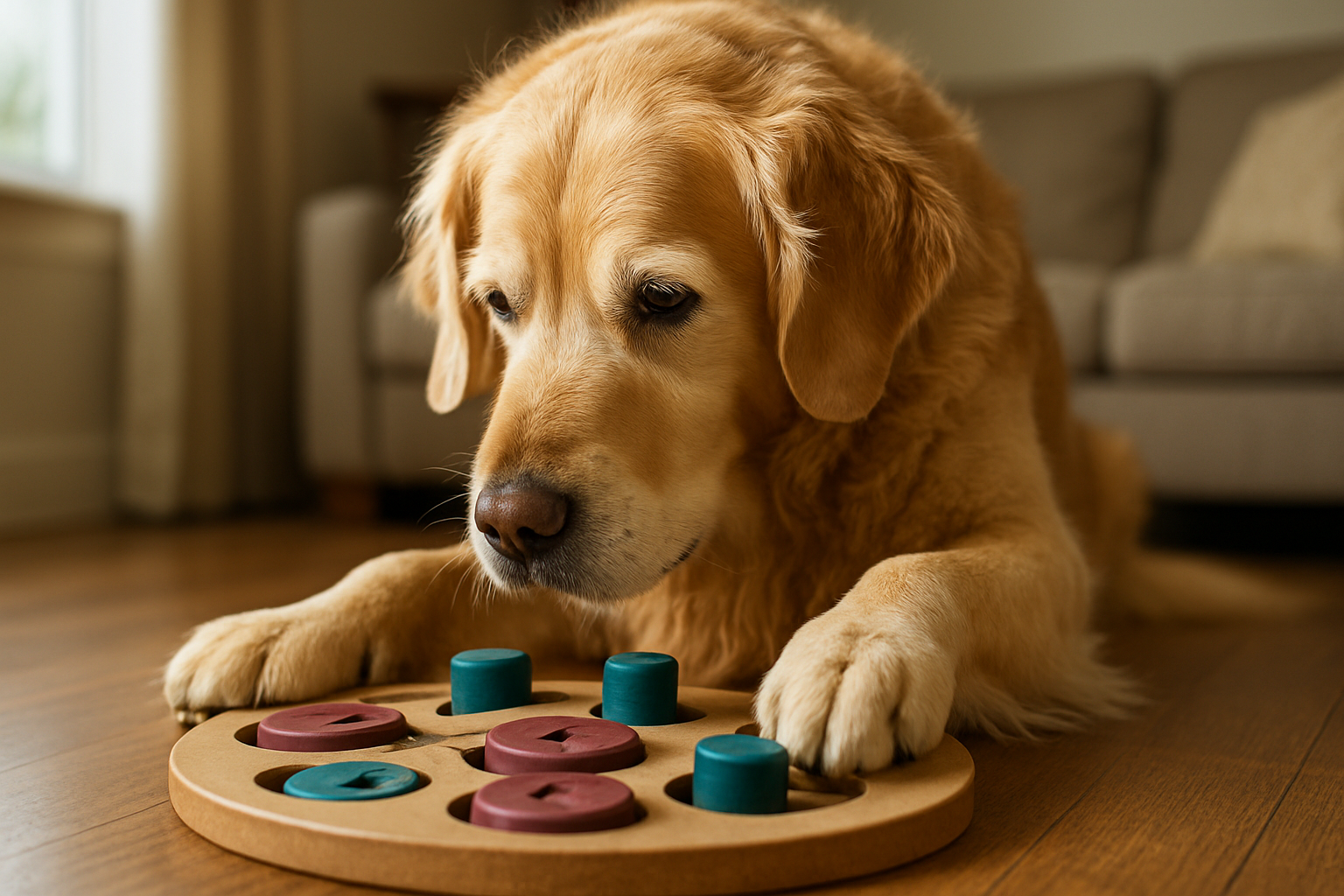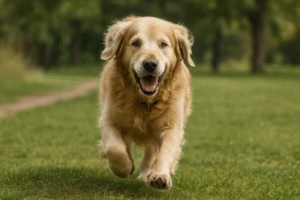Cognitive health represents one of the most critical yet often overlooked aspects of caring for senior Golden Retrievers, with mental stimulation playing a vital role in maintaining brain function, preventing cognitive decline, and preserving the intelligence and personality that make these dogs such beloved companions. As Golden Retrievers age, their brains undergo changes similar to those experienced by aging humans, including decreased processing speed, reduced memory capacity, and potential development of canine cognitive dysfunction syndrome. However, research consistently demonstrates that dogs who receive regular mental stimulation throughout their senior years maintain better cognitive function and experience slower rates of mental decline.
The concept of “use it or lose it” applies directly to canine cognitive health, making mental exercise as important as physical activity for senior Golden Retrievers. Unlike physical limitations that may restrict exercise options, mental stimulation can be adapted to accommodate virtually any physical condition while providing the cognitive challenges necessary to keep aging minds sharp and engaged. The key lies in understanding how to provide appropriate mental challenges that stimulate without overwhelming, engage without frustrating, and adapt to changing capabilities while maintaining the joy and satisfaction that come from mental accomplishment.
Golden Retrievers, originally bred as intelligent working dogs, possess natural problem-solving abilities and eagerness to please that make them excellent candidates for lifelong learning. Their gentle temperament and strong food motivation provide ideal foundations for implementing cognitive enrichment programs that can significantly impact their mental well-being throughout their senior years. The goal extends beyond simple entertainment to encompass genuine cognitive exercise that supports brain health, maintains mental acuity, and preserves the engaging personality that defines these remarkable dogs.
Understanding Cognitive Changes in Senior Golden Retrievers
Normal Age-Related Cognitive Changes
Senior Golden Retrievers experience predictable changes in cognitive function that begin subtly around age seven and may become more pronounced with advancing years. Understanding these normal changes helps distinguish between typical aging and pathological cognitive decline.
Processing Speed Reduction: One of the earliest changes involves slower information processing, meaning senior dogs may take longer to respond to commands, solve problems, or adapt to new situations. This doesn’t indicate reduced intelligence but rather reflects normal changes in neural processing speed.
Memory Modifications: Short-term memory may become less reliable while long-term memories often remain intact. Senior Golden Retrievers might forget recent events or changes in routine while still remembering well-established patterns and behaviors learned years earlier.
Learning Capacity Changes: While senior dogs can certainly learn new things, they may require more repetition and patience than younger dogs. The ability to form new memories and integrate new information may be reduced, though not eliminated.
Attention and Focus Variations: Senior dogs may have shorter attention spans or become more easily distracted during training sessions or mental activities. They might also show increased difficulty filtering out irrelevant stimuli.
Canine Cognitive Dysfunction Syndrome (CDS)
CDS represents a more serious form of cognitive decline that affects approximately 28% of dogs aged 11-12 years and over 68% of dogs aged 15-16 years. Early recognition and intervention can help slow progression and maintain quality of life.
DISHAA Assessment Framework:
| DISHAA Component | Normal Aging | Mild CDS | Moderate CDS | Severe CDS |
|---|---|---|---|---|
| Disorientation | Occasional confusion | Gets lost in familiar places | Frequent disorientation | Severe spatial confusion |
| Interaction Changes | Slight social reduction | Decreased family interaction | Withdrawal from social contact | Minimal social engagement |
| Sleep-Wake Disruption | Minor pattern changes | Restless nights, sleepy days | Significant cycle disruption | Day-night reversal |
| House Soiling | Rare accidents | Occasional inappropriate elimination | Regular accidents despite capability | Frequent soiling |
| Activity Changes | Reduced enthusiasm | Decreased interest in activities | Significant activity reduction | Minimal voluntary activity |
| Anxiety/Confusion | Mild uncertainty | Increased anxiety in new situations | Frequent confusion and distress | Persistent anxiety and confusion |
Risk Factors and Prevention
Genetic Predisposition: While Golden Retrievers don’t show higher rates of CDS than other breeds, individual genetic factors may influence cognitive aging patterns.
Physical Health Impact: Conditions such as arthritis, heart disease, or sensory impairments can accelerate cognitive decline by reducing activity levels and environmental interaction.
Environmental Enrichment: Dogs with lifelong exposure to varied experiences, training, and mental stimulation show better cognitive preservation in their senior years.
Social Interaction: Maintained social engagement with humans and other dogs supports cognitive health through continued learning and adaptation challenges.
Cognitive Assessment and Monitoring
Home-Based Cognitive Evaluation
Regular assessment of cognitive function helps identify changes that may require intervention or indicate the need for veterinary evaluation.
Memory Testing: Simple memory tests can be performed at home, such as hiding treats in familiar locations and observing whether your dog remembers where to look.
Problem-Solving Evaluation: Present familiar puzzle toys or simple problems and observe your dog’s approach, persistence, and success rate compared to previous performance.
Recognition Assessment: Monitor your dog’s ability to recognize familiar people, other pets, and routine objects or locations.
Learning Capacity: Introduce simple new commands or tricks and observe your dog’s ability to learn and retain new information.
Professional Cognitive Assessment
Veterinary Evaluation: Comprehensive cognitive assessment by veterinarians can help distinguish between normal aging and pathological decline while identifying treatable underlying conditions.
Standardized Testing: Some veterinary practices use standardized cognitive assessment tools designed specifically for dogs to provide objective measures of cognitive function.
Neurological Examination: Physical examination of neurological function helps identify potential medical causes of cognitive changes that might be treatable.
Mental Stimulation Strategies by Cognitive Level
High-Functioning Seniors (Minimal Cognitive Changes)
Senior Golden Retrievers with minimal cognitive decline can engage in complex mental activities that challenge their intelligence while accommodating any physical limitations.
Advanced Puzzle Toys: Complex puzzle feeders, treat-dispensing toys, and multi-step problem-solving challenges provide significant mental stimulation.
New Skill Learning: Teaching new commands, tricks, or behaviors keeps minds active and provides the satisfaction of accomplishment.
Scent Work Activities: Nose work games, hide-and-seek with treats, and scent discrimination exercises engage natural abilities while providing mental challenge.
Interactive Training Sessions: Short, frequent training sessions focusing on new skills or refining existing ones provide mental exercise and strengthen the human-dog bond.
| Mental Activity Type | Difficulty Level | Time Investment | Physical Requirements | Cognitive Benefits |
|---|---|---|---|---|
| Puzzle Feeders | Beginner to Advanced | 10-30 minutes | Minimal | Problem-solving, patience |
| Scent Work | Beginner to Expert | 15-45 minutes | Low to Moderate | Focus, discrimination, persistence |
| New Trick Training | Variable | 5-15 minute sessions | Variable | Learning, memory, coordination |
| Interactive Games | Beginner to Advanced | 10-20 minutes | Minimal to Moderate | Engagement, decision-making |
| Food Puzzles | Beginner to Intermediate | 15-30 minutes | Minimal | Persistence, problem-solving |
Moderate Cognitive Changes
Dogs showing mild to moderate cognitive changes benefit from simplified mental activities that provide stimulation without causing frustration.
Simplified Puzzles: Use easier puzzle toys or modify complex ones to ensure success while still providing mental challenge.
Routine-Based Games: Incorporate mental stimulation into established routines to provide familiarity while adding cognitive elements.
Short Training Sessions: Keep training sessions brief (5-10 minutes) and focus on familiar commands with small variations.
Sensory Stimulation: Use different textures, sounds, and scents to provide gentle cognitive stimulation that doesn’t require complex problem-solving.
Advanced Cognitive Changes
Senior dogs with significant cognitive changes require very gentle mental stimulation that focuses on comfort and familiarity rather than challenge.
Familiar Activities: Stick to well-known activities and routines that provide gentle stimulation without causing confusion or frustration.
Passive Stimulation: Provide environmental enrichment through different scents, textures, and gentle sensory experiences.
Comfort-Based Interaction: Focus on soothing activities like gentle brushing, massage, or quiet interaction that provide mental engagement without stress.
Practical Mental Stimulation Activities
Food-Based Mental Exercises
Food motivation makes Golden Retrievers ideal candidates for food-based cognitive activities that combine mental stimulation with natural feeding behaviors.
Puzzle Feeders: Replace regular food bowls with puzzle feeders that require manipulation to access food. Start with simple designs and progress to more complex versions based on your dog’s ability.
Treat-Dispensing Toys: Toys that release treats when manipulated correctly provide extended mental engagement while rewarding problem-solving behavior.
DIY Food Puzzles: Create homemade puzzles using muffin tins, toilet paper rolls, or plastic bottles to provide variety and customizable difficulty levels.
Snuffle Mats: These textured mats hide treats among fabric strips, encouraging natural foraging behaviors while providing mental stimulation.
Training-Based Cognitive Exercises
Command Review and Refinement: Regularly practice known commands while adding small variations or challenges to keep minds engaged.
New Behavior Chains: Link familiar commands together in new sequences to create more complex behavioral patterns that challenge memory and sequencing abilities.
Discrimination Training: Teach dogs to distinguish between different objects, people, or commands to exercise cognitive discrimination abilities.
Memory Games: Hide treats or toys and encourage your dog to remember and find them, starting with easy hiding spots and gradually increasing difficulty.
Environmental Enrichment Activities
Rotation of Toys: Regularly rotate available toys to maintain novelty and interest without overwhelming senior dogs with too many choices at once.
Scent Trails: Create simple scent trails using treats or familiar scents that encourage exploration and problem-solving within safe, familiar environments.
Texture Exploration: Provide different textures for walking or lying on to stimulate sensory awareness and cognitive processing.
Controlled Social Interaction: Arrange brief visits with familiar people or well-known dogs to provide social cognitive stimulation.
Adapting Activities for Physical Limitations
Mobility-Adapted Mental Exercises
Senior Golden Retrievers with mobility issues can still engage in meaningful mental activities with appropriate modifications.
Stationary Puzzles: Use puzzle toys that can be operated while lying down or in comfortable positions.
Elevated Food Stations: Place puzzle feeders at comfortable heights to reduce strain while maintaining mental challenge.
Bed-Based Activities: Develop activities that can be performed while resting, such as gentle training sessions or stationary puzzle toys.
Assisted Activities: Help dogs with mobility limitations participate in activities by providing physical support or modifying requirements.
Vision-Adapted Activities
Golden Retrievers with vision problems can participate in mental stimulation through enhanced use of other senses.
Scent-Based Exercises: Emphasize activities that rely on smell rather than sight, such as nose work games or treat-finding exercises.
Auditory Stimulation: Use sound-based cues and activities that don’t require visual processing.
Tactile Exploration: Provide different textures and surfaces for exploration through touch rather than sight.
Familiar Environment Focus: Keep activities within well-known spaces to reduce confusion and maintain confidence.
Hearing-Adapted Activities
Dogs with hearing impairments can engage in mental activities through visual and tactile cues.
Visual Signal Training: Use hand signals and visual cues to maintain training and mental engagement.
Vibration-Based Games: Incorporate gentle vibrations or touch-based cues to communicate and engage.
Visual Puzzle Toys: Focus on puzzle toys that rely on manipulation rather than auditory feedback.
Creating Structured Mental Exercise Programs
Daily Routine Integration
Morning Mental Warm-Up: Start each day with brief, gentle mental activities to stimulate cognitive function and establish positive daily patterns.
Meal-Time Challenges: Transform regular feeding into mental exercise opportunities through puzzle feeders and food-based games.
Afternoon Enrichment: Provide mid-day mental stimulation during natural rest periods to maintain engagement without overwhelming.
Evening Wind-Down: Use calming mental activities in the evening to provide gentle stimulation while promoting relaxation.
Weekly Programming Structure
| Day | Primary Activity | Secondary Activity | Duration | Focus Area |
|---|---|---|---|---|
| Monday | Puzzle Feeder | Scent Work | 20-30 minutes | Problem-solving |
| Tuesday | Training Session | Interactive Toy | 15-25 minutes | Learning/Memory |
| Wednesday | Food Puzzles | Texture Exploration | 20-30 minutes | Persistence |
| Thursday | Scent Games | Gentle Training | 15-25 minutes | Discrimination |
| Friday | New Activity | Review Session | 20-30 minutes | Adaptation |
| Saturday | Social Interaction | Favorite Activities | 30-45 minutes | Engagement |
| Sunday | Relaxed Puzzles | Comfort Activities | 15-25 minutes | Gentle Stimulation |
Progress Monitoring
Activity Logs: Keep records of activities attempted, duration, success rates, and your dog’s apparent enjoyment level.
Behavioral Observations: Monitor changes in alertness, engagement, and cognitive function that may indicate program effectiveness.
Difficulty Adjustments: Regularly assess whether activities are appropriately challenging without being frustrating, adjusting difficulty as needed.
Veterinary Updates: Share observations and progress with veterinary professionals during routine visits to guide ongoing care decisions.
Technology-Enhanced Mental Stimulation
Interactive Electronic Toys
Modern technology offers innovative options for providing mental stimulation to senior Golden Retrievers.
Automated Puzzle Feeders: Electronic feeders that dispense treats based on problem-solving activities can provide consistent mental challenges.
Interactive Cameras: Pet cameras with treat-dispensing features allow mental stimulation even when owners are away from home.
Motion-Activated Toys: Toys that respond to movement can provide gentle mental stimulation for dogs with limited mobility.
Apps and Digital Tools
Training Apps: Smartphone applications can provide structured training programs and track progress in cognitive activities.
Activity Monitors: Wearable devices can track activity levels and help optimize mental stimulation timing and intensity.
Video Stimulation: Specially designed videos for dogs can provide visual and auditory stimulation, though this should supplement rather than replace interactive activities.
Nutritional Support for Cognitive Health
Brain-Supporting Nutrients
Certain nutrients can support cognitive function and may enhance the effectiveness of mental stimulation programs.
Omega-3 Fatty Acids: DHA and EPA support brain cell membrane integrity and may slow cognitive decline when combined with mental exercise.
Antioxidants: Vitamins E and C, along with other antioxidants, help protect brain cells from oxidative damage associated with aging.
Medium-Chain Triglycerides: These fats provide alternative energy sources for aging brains and may support cognitive function.
B-Complex Vitamins: These vitamins support neurotransmitter function and nervous system health.
Cognitive Diet Considerations
Prescription Cognitive Diets: Some commercial diets are specifically formulated to support cognitive function in senior dogs through enhanced nutrient profiles.
Supplement Integration: Work with veterinarians to determine whether cognitive support supplements might benefit your individual dog.
Meal Timing: Coordinate feeding times with mental activities to optimize energy availability for cognitive tasks.
Social Cognitive Stimulation
Human Interaction
Quality Time: Dedicated one-on-one interaction provides social cognitive stimulation while strengthening bonds.
Gentle Training: Short, positive training sessions maintain cognitive engagement while reinforcing the human-dog relationship.
Exploration Together: Supervised exploration of new (safe) environments provides shared experiences that stimulate cognitive function.
Multi-Dog Households
Supervised Play: Gentle interaction with other household dogs can provide social cognitive stimulation.
Group Activities: Simple group training or feeding activities can provide social learning opportunities.
Observation Learning: Senior dogs can benefit cognitively from observing other dogs’ activities and behaviors.
Monitoring and Adjusting Mental Stimulation Programs
Success Indicators
Increased Alertness: Dogs receiving appropriate mental stimulation often show improved alertness and engagement with their environment.
Better Sleep Patterns: Mental exercise can contribute to improved sleep quality and more regular sleep-wake cycles.
Maintained Interest: Continued interest in food, activities, and social interaction indicates successful cognitive engagement.
Problem-Solving Persistence: Maintained or improved persistence when facing challenges suggests healthy cognitive function.
Warning Signs
Frustration or Agitation: Activities that consistently cause frustration should be modified or replaced with more appropriate options.
Withdrawal: Decreased interest in previously enjoyed activities may indicate the need for program adjustments or medical evaluation.
Confusion or Disorientation: Increased confusion during activities may suggest cognitive decline requiring veterinary assessment.
Physical Stress Signs: Excessive panting, restlessness, or other stress indicators suggest activities need modification.
Long-Term Cognitive Health Strategies
Lifelong Learning Approach
Continuous Adaptation: Mental stimulation programs should evolve with changing cognitive abilities and physical capabilities.
Variety Maintenance: Regular introduction of new activities prevents habituation and maintains engagement.
Difficulty Calibration: Continuously adjust activity difficulty to maintain appropriate challenge levels without causing frustration.
Quality of Life Focus
Individual Preferences: Tailor programs to individual dogs’ preferences, abilities, and interests for maximum benefit and enjoyment.
Comfort Priority: Ensure that cognitive activities enhance rather than stress quality of life, modifying approaches as needed.
Family Integration: Involve family members in cognitive activities to maintain social bonds and shared experiences.
Preserving the Golden Mind
Keeping senior Golden Retrievers’ minds active represents one of the most rewarding aspects of caring for aging dogs, offering opportunities to maintain the intelligence, personality, and engagement that make these companions so special. The investment in cognitive health through appropriate mental stimulation pays dividends in preserved mental function, enhanced quality of life, and continued opportunities for meaningful interaction and shared experiences.
The journey of maintaining cognitive health in senior Golden Retrievers reflects the deep understanding that these dogs remain capable of learning, growing, and engaging throughout their lives. Each puzzle solved, each new skill learned, and each moment of mental engagement contributes to the preservation of the cognitive abilities that define their unique personalities and strengthen the bonds with their human families.
Success in cognitive care lies not in maintaining the exact capabilities of younger years but in adapting challenges and activities to support continued mental engagement at levels appropriate for aging minds and bodies. The goal encompasses preserving dignity, maintaining interest in life, and supporting the cognitive functions that allow senior Golden Retrievers to continue being the intelligent, responsive companions they have always been.
Your commitment to keeping your senior Golden Retriever’s mind active demonstrates profound understanding of their need for continued growth and engagement throughout their golden years. Through thoughtful provision of mental stimulation, adaptive programming, and patient encouragement, you ensure that their minds remain as golden as their hearts, preserving the intelligence and personality that make every day together a treasure.





Comments
Pingback: Psychology of Habit Formation for Golden Retrievers
Pingback: How to Correct Aggressive Behavior in Dogs
Pingback: How to Keep Senior Golden Retrievers Comfortable in Their Daily Lives